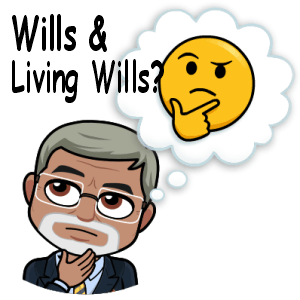Wills and Estate Planning Overview

Your Estate
What is Estate Law

Your Will & Living Will
Why You Need One

Power of Attorney
Why It's Important

Financial & Estate Planning
Protect Your Assets
Glossaries
An estate is the real property and tangible personal property a person possesses at death. Estate planning law involves the drafting of living wills, trusts, powers of attorney, and other documents to facilitate the transfer and management of property after death. It also includes such things as nursing home planning, irrevocable Medicaid trusts, Probate & Estate Administration, and Estate Financial Planning. Wills and estate planning are sensitive subject and many people ask themselves if they need to do this even if they are young. At the very least it is recommended that once people reach the age of majority they should draft and sign a will. As you grow in your career and build up your assets you should review your will and consider estate planning.
What is Estate Law?
In the common law, a will or testament is a document by which a person (the testator) regulates the rights of others over his or her property or family after death. Any person over the age of 18 can draft his own will without the aid of an attorney. Although there is no legal requirement that a will be drawn up by a lawyer, there are many pitfalls into which home-made wills may fall, and it is highly desirable that any will is the subject of legal advice before drafting or execution. The person who makes a will is not available to explain him or herself, or to correct any technical deficiency or error in expression, when it comes into effect on that person’s death, and so there is no room for mistakes. If you die without a Will, you have died intestate. Your property must go through the probate process in order to have the legal title to the property transferred to your heirs at law. Your heirs at law are defined by applicable state statutes. The law of the state where you live controls the distribution of your personal property. As such, your desires may not be fulfilled. At Santillán Law, P.C., we can assist you in preparing your will in order that your last wish(es) be followed.
General Wills & Estate FAQ
A living will is a written statement about what treatment you would want if you are seriously ill, in a persistent vegetative state or irreversible coma. It provides guidance about your general philosophy—ranging from “I do not want any life-sustaining treatment beyond comfort care” to “I want my life to be prolonged as long as possible.”
Trusts are legal arrangements that can provide incredible flexibility for the ownership of certain assets, thereby enabling you and your heirs to achieve a number of significant personal goals that cannot be achieved otherwise. The term trust describes the holding of property by a trustee, which may be one or more persons or a corporate trust company or bank, in accordance with the provisions of a contract, the written trust instrument, for the benefit of one or more persons called beneficiaries. The trustee is the legal owner of the trust property, and the beneficiaries are the equitable owners of the trust property. A person may be both a trustee and a beneficiary of the same trust.
Trusts are not only for the wealthy. Many young parents with limited assets choose to create trusts either during life or in their wills for the benefit of their children in case both parents die before all their children have reached an age deemed by the parents to indicate sufficient maturity to handle property.
Trusts created during your lifetime can be revocable or irrevocable. Trusts can help you accomplish and meet goals including care in your elder years. Consult with one of our attorneys to understand the difference in types of trusts.
A will does not govern the transfer of certain types of assets, called non-probate property, which by operation of law (title) or contract (such as a beneficiary designation) pass to someone other than your estate on your death.
A will provides for the distribution of certain property owned by you at the time of your death, and generally you may dispose of such property in any manner you choose.
Wills can be of various degrees of complexity and can be utilized to achieve a wide range of family and tax objectives. If a will provides for the outright distribution of assets, it is sometimes characterized as a simple will. If the will creates one or more trusts upon your death, the will is often called a testamentary trust will. Alternatively, the will may leave probate assets to a preexisting inter vivos trust (created during your lifetime), in which case the will is called a pour over will.
If you die intestate (without a will), your state’s laws of descent and distribution will determine who receives your property by default. That plan may or may not reflect your actual wishes, and some of the built-in protections may not be necessary in a harmonious family setting. A will allows you to alter the state’s default plan to suit your personal preferences. It also permits you to exercise control over a myriad of personal decisions that broad and general state default provisions cannot address.
Estate planning covers the transfer of property at death as well as a variety of other personal matters and may or may not involve tax planning. The core document most often associated with this process is your will.
In the case of complex estates the process can involve your accountant, financial planner, ;life insurance broker, banker, and broker.
Santillán Law P.C. understands that your last will and testament is your opportunity to tell your family and the courts what you want to happen to your assets after you are gone. Your will can also express your wishes about funeral arrangements and the care of your children if they are under the age of 18.
Please contact to set up an appointment. We are here to help you!
Wills
Santillán Law P.C. offers cost effective services backed by reliable legal advice from experienced attorneys
Chances are that you have seen advertisements online and in stores for do-it-yourself will kits and forms. We recognize that these options are tempting because of their relatively low cost. However, drafting your own will is also a risky venture with many potential frustrations.
Having your will drafted by an experienced estate planning attorney can give you confidence that it is legally valid and does not include any provisions that go against your wishes.
We will also advise you if we believe you need something other than a simple will to achieve your personal goals. For instance, we may recommend a will with a contingent trust or a revocable living trust with a pour-over will. Of course, the final decision on your will is always yours.
Whether you are looking for a $25 simple will or a more comprehensive estate plan, you can rely on us for personal attention and prompt responses to your questions and concerns.
Please contact to set up a no obligation appointment.
Living Wills
A living will is one type of advance health directive, or advance health care directive. It is often accompanied by a specific type of power of attorney or health care proxy. The living will usually covers specific directives as to the course of treatment that is to be taken by caregivers, or, in particular, in some cases forbidding treatment and sometimes also food and water, should the principal be unable to give informed consent (“individual health care instruction”) due to incapacity. The living will should be accompanied by a power of attorney for health care which appoints an individual (a proxy) to direct health care decisions should the principal be unable to do so.
Santillán Law, P.C., can assist you in preparing your living will in the event that an emergency arises and you are unable to make medical decisions and/or desire that certain wishes be followed.
The importance of the living will became apparent during the early part of 2005, with the case of Terri Schiavo. No matter where one falls on each side of the Schiavo controversy, many have highlighted Schiavo’s case to make the point that people should make living wills regardless of age or current health status, pointing to the fact that even younger people can face terminal illness or have an accident. For example, Schiavo suffered her brain injury when she was only in her mid-20s. Expressing one’s wishes verbally is not enough. We believe that an individual’s wishes should be formally documented. Legal experts agree that the entire court battle could have been avoided if Schiavo had properly documented her wishes prior to her collapse. Do not make the same mistake. Allow us to help.
Please contact to set up a no obligation appointment.
Power Of Attorney
An important part of estate planning is considering what you want to happen to you and your assets in the event that you become physically or mentally incapable of caring for yourself. Powers of attorney are one of the two tools that can be used to address these issues. The other being a living will.
A power of attorney is a document that gives someone else the authority to act on your behalf. Your power of attorney can be general or limited to specific issues — such as financial or medical issues — and it can take effect right away or only after you become incapacitated.
Many people have strong preferences regarding these personal matters. We will take the time to listen to your concerns so we can recommend the right approach to meet your needs.
This may involve the creation of a combined health care power of attorney and living will (also known as an advance health care directive) or the drafting of separate documents. We will take the time to make sure you understand the consequences of whatever approach I recommend.
If you are not sure whether you need to plan for incapacity, we can advise you on your options. Generally, this type of planning is vastly preferable to the eventual need for a guardianship.
Contact us to set up a no obligation appointment.
Financial & Estate Planning
Long Term Care
Nursing home care and in-home nursing care are necessities for many people who have become incapable of caring for themselves on a day-to-day basis. By planning ahead, you may be able to reduce the impact of eventual nursing care on your assets and your family. Practically speaking, when an elderly loved one enters the nursing home, that expense becomes the largest expense your family has. For most middle class families, any money in any account would eventually be used to pay for care. The cost of hiring an attorney is far less than the potential cost of paying for long-term nursing home care. The cost savings, coupled with the peace of mind you get from knowing that your loved one is protected by an experienced lawyer makes it well worth it to seek representation. In most cases, the cost of an experienced elder law attorney is paid from funds earmarked for the nursing home.
If you do not have long-term care insurance and do not qualify for government benefits such as Medicaid, nursing care can put a major dent in your assets. Our main goal when a client retains me to assist with nursing home planning is to prevent this from happening.
- If you think you may need nursing care in the future, it is never too early to take financial planning steps. By updating your estate plan and doing some gift planning, We may be able to help you preserve your assets and take full advantage of government benefits.
- If a loved one needs to go into a nursing home now, there may be steps I can take to protect his or her assets from being taken to pay nursing care bills. At this stage, it is important to get independent legal advice and not rely on advice from the nursing home.
- Advanced Medicaid planning is an excellent opportunity to take the steps necessary to qualify for Medicaid without incurring the legal penalties. A Medicaid trust is a very useful tool for divesting yourself of assets and making yourself eligible for Medicaid.
Santillán Law P.C. understands that the need for long-term nursing care — now or in the future — can be an intimidating and emotional prospect. We can offer compassionate guidance and assistance with all aspects of the nursing care planning process to reduce the stress on you and your family.
You can rely on us for personal attention and prompt responses to your questions and concerns.
Contact to set up a no obligation appointment.
Probate & Estate
Santillán Law P.C. understands that the loss of a loved one is a difficult time for any family. The last thing you should have to worry about is how and when the legal necessities will be taken care of. The assistance of an experienced lawyer can help you ensure that the estate is administered properly and promptly.
Estate administration, also known as probate, is the process of wrapping up the affairs of someone who has died and who has not placed his or her assets into a trust. The administration of an estate typically involves multiple steps, including the following:
- Opening the estate and having an executor appointed
- Settling any outstanding creditor claims against the estate
- Setting funds aside in an escrow account to pay any final bills
- Distributing the assets according to the will or the intestacy laws
When you retain us to handle your case, you can be confident that we will not drag out the administration of your loved one’s estate for years over issues that could be resolved quickly. If a will contest or other dispute arises, we will take action to pursue a positive resolution.
If your loved one had a trust, you may also need assistance with trust administration. Under the new Pennsylvania Uniform Trust Act, it is inadvisable to attempt to administer a trust without the assistance of a lawyer. We can guide you through the trust administration process
Contact us to set up a no obligation appointment.
This website is for informational purposes only and does not provide legal advice. Please do not act or refrain from acting based on anything you read on this site. Using this site or communicating with Santillán Law P.C. through this site does not form an attorney/client relationship. This site is legal advertising. Please review the full disclaimer for more information. (Click Here for Full Disclaimer Page)

